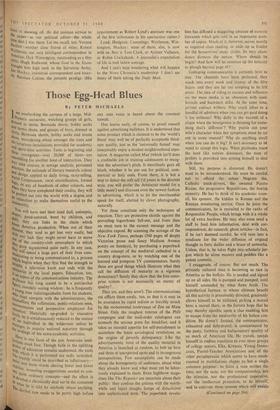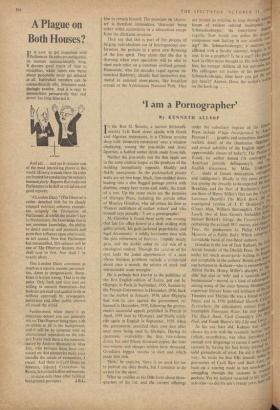Those Egg-Head Blues
By PETER MICKAELS AM overlooking the campus of a large, Mid- Western university, watching groups of girls, dressed in shirts, Bermuda shorts, bobby socks 4d tennis shoes, and groups of boys, dressed in shirts. Bermuda shorts, bobby socks and tennis the lb.. meandering about amongst the trees and Locurious installations provided for academic and spare-time activities. Term is beginning and these youngsters—over 20,000 of them—are assembling "wlirig for another bout of instruction. They may select take courses in sewage analysis, personnel on. the rationale of literary, research, colour an Ivor Communism, applied to daily living, story-telling, "-ortimunism, rural electrification, formal 4)gieor any of hundreds of other subjects, and when they have completed their credits, they will bePushed out into the world with a degree, and an in unction to make themselves useful to the cumin—Amity.
You I will have met their kind (tall, antiseptic, good-natured, beset by children, and dull); they are links in the chain which eierr7 America productive. When out of their withunt, they tend to get lost very easily, but out Of luck they might never have to move they uf the• country-club atmosphere to which they °evv acustomed quite early. In any case, • will spend a large part of their lives com- :ating or being communicated to, a process d,,11,[ begins when they first find the strength to ay; 0,i'tuute a television knob and ends with the is tries in the local papers. Education, too,
vtof
n aspect of the communications industry. The 48ureessor haS long ceased to be a patriarchaly, remotely oozing wisdom: he is frequently - hung man indistinguishable from his students, r, must compete with the administrators, the t1 nun • '(1). I'S, the columnists, public-relations men, —flientators and prospective ,employers for el atten „ I '°o. Materially up-graded to executive o ' he is simultaneously reduced to the stature fanms individual in the wilderness unless' he alans. his waea to acquire national notoriety through ritihgs of his extra-academic activities. Here is one 'fact of the jam merican intel- eit, pnwels must face.e Though faith iAn the uplifting wi r of education remains undimmed, the tools th The which it is performed are sadly tarnished. More trouble could be described as inflationary— remit. and More words chasing fewer and fewer 'ey s mounting exaggerations needed to con- vey ordinary concepts—and the effect is to to de velOP a chronically deaf ear in the consumer The what he is told by anybody about anything. decibel rate needs to be pretty high before any solo voice is heard above the constant tumult.
One learns early, of course, to proof oneself against advertising ballyhoo. It is understood that some product which is claimed to be the 'world's finest' may well be of perfectly acceptable third- rate quality, just as the 'universally famed' may conceivably enjoy a modest neighbourhood repu- tation. A magazine called Mad (which isn't) does a creditable job in training adolescents to recog- nise the advertiser's pitch. It mercilessly guys all blurb, whether it be put out for political, com- mercial or holy ends. From there, it is but a step to detect the soft sell ('if yours is the discreet style, you will prefer the Aristocrat model for a little more) and discount even the newest fashion in advertising, which is to let the merchandise speak for itself, abetted by clever photography, naturally.
Yet these constitute only the techniques of rejection. They are protective shields against the prevailing logorrhoeic fall-out, and from then on must turn to the earnest message and the objective expose. By scanning the acreage of the New York Times, perhaps (360 pages of deeply Victorian prose and fancy Madison Avenue poetry on Sundays), by purchasing a paperback on the concept of the mediaeval cathedral in a country drug-store, or by watching one of the learned and pompous TV commentators. Surely these are good things which illustrate what they call the diffusion of maturity in a vigorous democracy? Surely they show that the free enter- prise system is not necessarily an enemy of quality?
They are, and they aren't. The communications rot afflicts them sorely, too, so that it is easy to be overtaken by rapid tedium or forcibly struck by the monumental irrelevance of Zen on Main Street. Only the toughest veteran of the PhD campaigns and the mail-order catalogues can stomach the serious press for breakfast, and it takes an intrepid appetite for self-punishment to assimilate the latest sociological revelations on the origins of juvenile delinquency. Like the advertisements, most of the quality material in America is launched at random, to bob up here and there at unexpected spots and in incongruous juxtapositions. Few assumptions can be made about the homogeneity of audiences, about what they already know and what must yet be labor- iously explained to them. Even highbrow maga- zines like The Reporter are uncertain about their public: they confuse the solemn with the worth-, while and inject doughy lumps of didacticism into sophisticated texts. The paperback revolu- tion has diffused a staggering amount of esoteric literature which gets sold in an impressive num- ber of copies. Much of it, however, serves merely as required class reading, or ends up as fodder for the housewives' study circles. Its very abun- dance dismays , the novice. Where should he begin? And how will be summon up the tenacity to plough beyond page 43?
Galloping communicatitis is certainly here to stay. The channels have been perfected, they reach into every nook and cranny of the fifty States. and they are far too tempting to be left alone. The idea of riding to success and influence on the mass media is an obsession with intel- lectuals and hucksters alike. At the same time, private contact withers. Why crack jokes to a handful of admirers when you can get paid doing it for millions? Why daily in the warmth of a clique when the bourgeoisie is thirsting for some- thing that's 'different'? Why puizle out your wife's character when her symptoms must be set out in some manual? Why do anything small when you can do it big? It isn't necessary to b4 venal to accept this logic. When platitudes roam the land like outsize dinosaurs, the man of probity is provoked into arming himself to deal with them.
Still, his purpose is distorted. He doesn't want to be misunderstood. He must be careful not to offend the urban Negroes the, Catholic truck-drivers, the sweated Puerto Ricans, the progressive Republicans, the Jewish minority. He has to think of his academic coun- cil, his sponsor, the kiddies in Kansas and the Russian monitoring service. Once he joins the communicators, he is recruited to the ranks of Responsible People, which brings with it a whole lot of extra burdens. He may also soon need a staff to feed him information, deal with cor- respondence, do research, ghost articles—in fact, if he isn't damned careful, he will turn into a syndicate for the wider diffusion of original thought in forty dailies and a brace of networks. Unless, that is, he takes flight into scholarly jar- gon which he alone masters and peddles like a patent cosmetic.
I exaggerate, of course. But not much. The privately cultured man is becoming as rare in America as the buffalo. He is needed and signed up on all sides. He is pumped and pumped, until himself astounded by what flows forth. The hypothetical layman, to whose ultimate benefit all this activity is presumably directed, graciously allows himself to be titillated, picking a morsel here, a morsel there, in the forlorn hope that he may thereby stumble upon a clue enabling him to escape from the mediocrity of his listless con- dition. He doesn't. Instead, the communicator, exhausted and dehydrated, is contaminated by the pasty, formless and hall4cinatory quality of so much of American life. He travels, spends himself in endless repetition to ever more groups of college seniors, Elks, Kiwanis, Young Demo- crats, Parent-Teacher Associations and all the other paraphernalia which seems to have mush- roomed in multifarious shapes to but a single common purpose: to leave a man neither the time, nor the taste, nor the companionship, nor the stimulus, nor the professional imperative, nor the intellectual protection, to be himself, and to cultivate those sources which will enable
(Continued on page 594)
him to remain himself. The premium on 'charac- ter' is therefore tremendous, 'character' being either wilful eccentricity or a miraculous escape from the dilettante invasion.
They say that this is part of the process of forging individualism out of heterogeneous con- formism, the prelude to a great new flowering of the free spirit. They claim that the day is dawning when even specialists will be able to meet each other on a common civilised ground. Humanists, who for decades raged against en- trenched Babbiory, already find themselves pro- moted as national show-pieces, like breakfast cereals or the Yellowstone National Park. They
are invited to criticise, to leap through selected hoops of evident cultural inadequacy. Schmuckenberger,' the interviewer inquires` eagerly. 'how would you define the. d.rilan"c component now lacking in our scientific trai ing?' Dr. Schmuckenbcrger, a cautious 0130 afflicted with a faculty stammer, boggles in his seat. Is he a prophet? Is he a sage? His Paren15 back in Ohio never thought so. His wife hi11°11"„ him, his teenage children all but patronise lini/ His colleagues are jealous of his Prominence. Schmuckenberger, what have you got the next guy hasn't? Answer, Dave, the nation's waiting on the hook up. . . .



















































 Previous page
Previous page